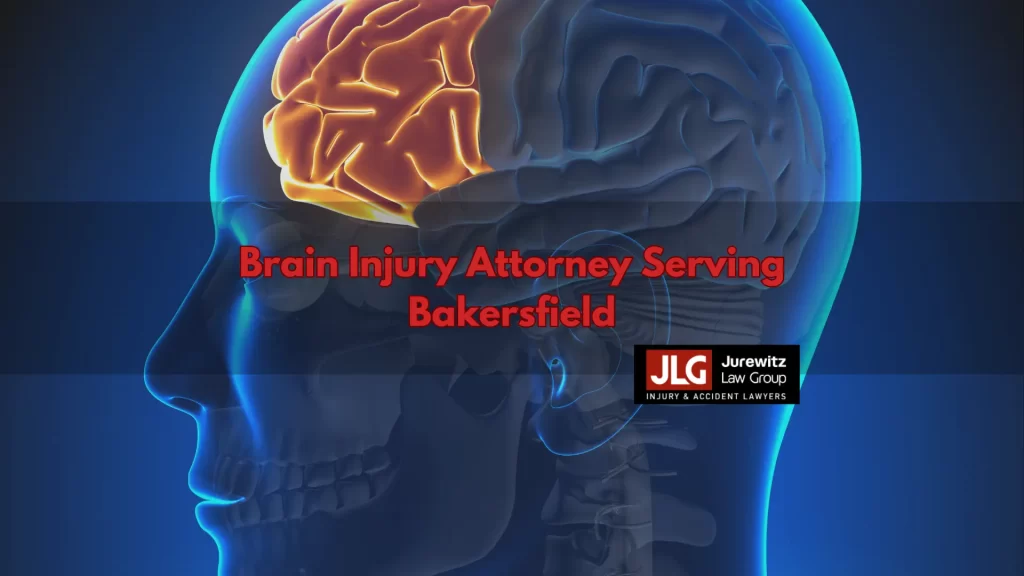
If you suffered a brain injury due to someone else’s negligence, contact the Bakersfield personal injury attorneys of Jurewitz Law Group Injury & Accident Lawyers today. We could represent you in your case against the party responsible for causing the accident. You might be entitled to financial compensation.
Brain injuries range broadly in severity. They can damage parts of the brain and disrupt functioning temporarily or permanently. Some people recover within a few weeks or months, while others end up with an ongoing disability.
Various circumstances can cause different types of brain injuries. Concussions commonly occur in motor vehicle crashes. They can also result from a fall if someone hits their head on the ground. The symptoms are often debilitating and cause physical and mental impairments. Complications might arise that lead to long-term health problems.
Jurewitz Law Group Injury & Accident Lawyers know how traumatic it can be when a brain injury places your life on hold. You might be unable to return to work or take care of yourself. Some people require daily assistance performing routine tasks. The cost of medical care is expensive and could cause financial strain. Some accident victims can’t pay their medical bills and face debt while treating their brain injuries.
Someone else is responsible for your suffering. They should face the consequences of their misconduct. Our brain injury attorneys in Bakersfield, CA, are ready to help you pursue legal action against the negligent party. We will create a plan to meet the unique needs of your case and prove what happened. Our team will dedicate the necessary time and attention to every aspect of the process and try to reach a favorable result.
For a free consultation to learn more about your available options and what we can do for you, call us at (619) 233-5020 for a free consultation or contact us online.
Common Types of Brain Injuries
A brain injury can result from a range of scenarios. Symptoms can appear immediately after an accident or might take days or weeks to develop. Mild brain injuries typically require rest and minimal medical care to heal. However, months of rehabilitation might be necessary for severe damage to the brain.
Two types of brain injuries can happen.
Non-Traumatic Brain Injury
External physical blows to the head don’t cause a non-traumatic brain injury. Instead, these injuries can result from incidents such as:
- Brain aneurysm
- Metabolic disorder
- Oxygen deprivation
- Illness
- Cardiac arrest
- Drowning
A non-traumatic brain injury can fall under two main classifications:
- Hypoxic injury – Hypoxia is reduced blood flow to the brain. This decreases the amount of oxygen received by the brain.
- Anoxic injury – Anoxia is a total lack of oxygen, which prevents the brain from functioning normally.
Traumatic Brain Injury
The head or body can suffer a violent blow or jolt and cause a traumatic brain injury (TBI). A penetrating injury can also cause a TBI. For example, shrapnel from a car accident could fracture the skull and penetrate the brain.
The cause of the injury determines the classification of a person’s traumatic brain injury. These classifications include:
- Diffuse axonal injury – An injury causes the brain to shift and rotate inside the skull, tearing the long connecting nerve fibers. A diffuse axonal injury leads to microscopic changes in the brain and could result in a coma.
- Coup-contrecoup – A coup-contrecoup injury occurs in two stages. The brain moves forward and impacts the front of the skull from an external force in the first stage. Then the brain rebounds off the front of the skull and impacts the back of the skull. Both impacts cause damage to the brain.
- Concussion – A concussion results from a violent and sudden blow or movement to the head. It alters brain functioning and can cause temporary memory, coordination, and concentration problems.
- Intracranial hematoma – A hematoma typically happens when a blood vessel in the brain ruptures, causing blood to collect within the skull. It can be fatal without prompt treatment to repair the damage and relieve pressure on the brain.
- Contusion – Contusions are bruises. A brain contusion can cause bleeding and swelling near the injury site.
- Penetrating brain injury – An object that enters the skull and damages the brain causes a penetrating brain injury. Emergency medical care is often necessary to reduce swelling, stop internal bleeding, and close the head wound.
The symptoms of a traumatic brain injury depend on how serious the damage is. Below are the most common symptoms of a TBI based on the degree of severity.
Mild Traumatic Brain Injury
A mild TBI happens when the head suffers a blow, jolt, or bump that causes the brain to move rapidly back and forth within the skull. Symptoms might occur instantly but could take days or weeks to appear. The damage is usually temporary and heals entirely with adequate treatment.
Symptoms of a mild traumatic brain injury can include:
- Headaches
- Loss of consciousness between several seconds and a few minutes
- Blurry vision
- Vomiting or nausea
- Difficulty sleeping or sleeping more than normal
- Sound or light sensitivity
- Dizziness or loss of balance
- Trouble with speech
- Concentration or memory problems
- Fatigue or drowsiness
- Mood changes
- Feeling depressed or anxious
Moderate to Severe Traumatic Brain Injury
A blow, bump, or jolt to the head or a penetration injury can lead to a severe TBI. Symptoms typically start within the first couple of hours or days after the injury. Cell, nerve, and tissue damage could be permanent and cause long-term complications. Recovering from a severe brain injury is possible, but some people suffer impairments and disabilities.
Common symptoms of a moderate to severe TBI include:
- Slurred speech
- Dilated pupil in one or both eyes
- Profound confusion
- Loss of coordination
- Repeated vomiting or nausea
- Coma and other consciousness disorders
- Inability to wake up after sleeping
- Persistent or worsening headache
- Convulsions or seizures
- Agitation, combativeness, and other unusual behaviors
- Weakness or numbness in the toes and fingers
- Loss of consciousness for several minutes to hours
Diagnosing a traumatic brain injury in children can be difficult. Some kids can’t vocalize what they’re feeling, so recognizing the signs requires observing the child’s behaviors and unusual symptoms. The most common signs of TBI in children include:
- Drowsiness
- Sad or depressed mood
- Reduced or loss of attentiveness
- Irritability
- Changes in eating or nursing habits
- Seizures
- Loss of interest in favorite toys or activities
- Changes in sleeping habits
- Persistent crying and inability to be consoled
A doctor can perform a thorough examination to diagnose a TBI. They might recommend a CT scan to determine the location and severity of the injury. They can also use imaging tests to discover complications like brain swelling and bleeding. If you notice any brain injury symptoms, it’s crucial to visit your doctor immediately.
Most Common Causes of Brain Injury
A range of contributing factors can cause a brain injury. It doesn’t have to involve a catastrophic incident. Sometimes, people are unaware of the damage they suffer until weeks later, when they start experiencing symptoms. Whether the injury is minor or severe, you should contact Jurewitz Law Group Injury & Accident Lawyers so we can start working on your case.
Our Bakersfield brain injury attorneys have over a decade of experience representing clients in cases such as:
- Dog attacks
- Wrongful death
- Truck accidents
- Premises liability
- Boat accidents
- Pedestrian accidents
- Elder abuse
- Bicycle accidents
- Car accidents
- Motorcycle accidents
- Airplane accidents
If your brain injury resulted from any of the circumstances above, contact Jurewitz Law Group Injury & Accident Lawyers for representation. You should not attempt to pursue compensation from the at-fault party yourself. Without an experienced lawyer by your side, you could make a mistake that damages your chances of holding the negligent person liable.
Compensation Available for a Brain Injury
 You might be able to file an insurance claim or lawsuit to seek compensation for your injury. The money you receive in your case could cover losses, such as:
You might be able to file an insurance claim or lawsuit to seek compensation for your injury. The money you receive in your case could cover losses, such as:
- Medical bills
- Lost wages
- Lost earning capacity
- Emotional distress
- Pain and suffering
- Loss of enjoyment of life
- Physical impairment or disfigurement
- Property damage
You could also pursue exemplary damages in a lawsuit against the person or company that caused your brain injury. You might recover this type of financial award if you can show clear and convincing evidence of the defendant’s oppression, malice, or fraud.
Statute of Limitations for a Lawsuit
In California, you must file your lawsuit by a deadline. The statute of limitations for injury cases allows a two-year window. That means you have two years from the accident date to file suit if you want to seek compensation in court.
If the statutory deadline expires, you likely won’t get the chance to pursue legal action against the at-fault party. Although two years seems like enough time, you could face obstacles that bring the process to a screeching halt. It’s critical to hire Jurewitz Law Group Injury & Accident Lawyers immediately after the accident to begin the process.
You might want to start with an insurance claim and assume you can resolve it quickly. However, unexpected delays could prevent you from proceeding with your case. If the insurance company denies your claim and the statutory period has already run out, you won’t be able to pursue a lawsuit.
Contact Us
Jurewitz Law Group Injury & Accident Lawyers proudly represent injured clients in Bakersfield. We have fought for accident victims since 2007 and are ready to do the same for you. Let us be the advocate you need to get through this overwhelming experience. You can count on us to fight for you.
If you suffered a brain injury in an accident someone else’s negligence caused, call (619) 233-5020 today for a free consultation with one of our Bakersfield brain injury attorneys.


